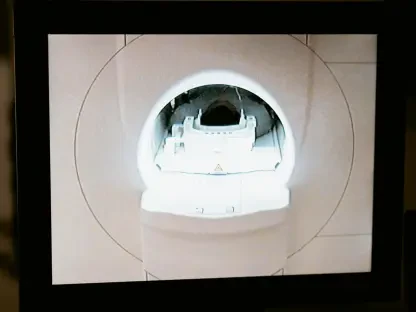The journey of Robert Donaher from diagnosis to recovery through the evolving landscape of cancer care serves as a powerful testament to the transformative potential of precision medicine in the management of melanoma. His story not only reinforces the significance of personalized treatment strategies but also provides a beacon of hope to individuals battling advanced Stage IV melanoma. As cancer treatment stands at the helm of precision medicine advancements, Robert’s journey underlines the importance of continuous innovation in therapeutic approaches.
Initial Diagnosis and Challenges
Early Stages and Diagnosis
In the realm of patient narratives, few stories highlight the journey from suspect detection to a battle with a formidable adversary as compellingly as Robert Donaher’s story. His odyssey began in 2007 when a seemingly innocuous spot on his left bicep was diagnosed as a dysplastic nevus, a noncancerous mole. Although there was no immediate cause for alarm, this diagnosis was an unmistakable bellwether of the potential for future melanoma development, as the risk associated with atypical moles became a precursor to his impending battle with a more aggressive form of skin cancer. In 2014, true to the latent hazards of dysplastic nevi, the appearance of a new growth at the same site signaled the onset of a challenging journey, eventually confirmed as malignant melanoma, thereby initiating Robert’s intensive engagement with modern cancer therapeutic strategies.
Transition to Clinical Trials
As Robert grappled with this challenging chapter, his pursuit of effective treatment pathways led him to an innovative clinical trial helmed by Dr. Asim Amin. This decision marked a significant juncture in his journey, illuminating the pathway for personalized cancer care. Clinical trials play an essential role in validating and refining cancer treatment standards. In Robert’s case, his participation offered a profound six-year remission, underscoring the potential of clinical studies to provide invaluable insights and life-extending options. Despite the inherent challenges and side effects he faced during this trial, the knowledge garnered laid the groundwork for the advancement of melanoma treatments and emphasized the indispensable role that experimental therapies play in evolving cancer care paradigms.
Facing Recurrence
Recurrence and Progression
Even after experiencing a period of remission, the persistent nature of melanoma posed new challenges for Robert. In 2020, the recurrence of this aggressive cancer surfaced ominously, initially presenting as an innocuous blemish on his chin. However, the subsequent diagnosis revealed a grave reality; the melanoma had metastasized to vital organs such as the lungs and liver, underscoring its relentless progression and unpredictability. This recurrence not only tested Robert’s resolve but also spotlighted the crucial necessity for continuous advancements in precision medicine and targeted therapies so that melanoma patients can have hope. His journey highlighted the shifting dynamics in oncological treatment approaches that have been well documented and are constantly evolving to outpace the disease’s resilience.
Adaptive Treatment Approaches
Responding to the challenges of melanoma’s progression, Robert’s enrollment in the CheckMate 47 clinical trial provided a pivotal opportunity to explore new treatment avenues. While the trial’s innovative drug combination eventually secured FDA approval, Robert’s participation did not yield the expected outcomes, as his cancer showed progression. This setback, however, did not curtail his resolve or the adaptability of his treatment plan. Stepping away from the trial, Robert returned to a previously administered drug regimen, derived from an earlier trial experience. This strategic pivot resulted in yet another remission, showcasing the unpredictable yet adaptable nature of treatment strategies. These experiences illustrate a broader commitment within the medical community to tailor interventions that best match individual patient needs, reflecting a responsive and evolving approach in the field of oncology.
Embracing Precision Medicine
Personalized Treatment Plans
Amidst the ebb and flow of his ongoing battle with melanoma, Robert faced yet another formidable hurdle in 2023, characterized by new tumor growths. With unwavering determination, Robert and Dr. Amin embraced precision medicine’s potential, leveraging cutting-edge genetic testing techniques to uncover a specific mutation, NTRK3, in his tumor. This discovery marked a pivotal turning point, as it opened the door to targeted therapeutic interventions meticulously designed to counteract this genetic anomaly. Through the use of these tailored oral medications, Robert achieved remarkable results, ultimately reaching a “no-evidence-of-disease” status by September, demonstrating the efficacy of precision medicine. The experience resonates with a larger movement in oncology, where personalized treatment plans are increasingly becoming the cornerstone of cancer care.
Broader Implications and Hope
Robert’s case underscores a wider consensus within the oncology sector, emphasizing the profound role of genetic testing and customized interventions as paramount in modern cancer care. Under the expert guidance of Dr. Amin at Atrium Health Levine Cancer, this integration of genomic testing into the framework of clinical trials continues to kindle hope for a myriad of patients beset with limited options. As the narrative of precision medicine continues to unfold, Robert’s journey illuminates the broader implications of such landmark advancements in oncology, setting a paradigm for future practices in melanoma and offering tangible hope to countless patients. His story serves not only as a testament to the strides already made but also as a source of inspiration, reinforcing the transformative power of personalized medicine.
Life Beyond Cancer
Quality of Life and Activities
The long, arduous path Robert Donaher traversed through cancer treatment demonstrates the potential for recovery and a quality of life restoration following intensive medical interventions. Nearing the age of 60, Robert’s life paints a vivid picture of rejuvenation through his active engagements in sports like skiing and pickleball. These activities underscore the real-world benefits and tangible outcomes of cutting-edge medical care and therapies. He attributes his newfound vigor and peace of mind to the profound impacts of clinical trials and precision medicine innovations. Without a doubt, his narrative draws a compelling link between medical advancements and life beyond a cancer diagnosis, offering a passionate and hopeful perspective for cancer patients exploring and undergoing similar treatment pathways.
Support Systems and Advocacy
The journey of Robert Donaher from diagnosis to recovery showcases the promising capabilities of precision medicine in managing melanoma, acting as a testament to modern advancements in cancer care. His story underscores the critical role of personalized treatment strategies, forging a path of hope for those coping with advanced Stage IV melanoma. In today’s evolving landscape, precision medicine stands at the forefront of cancer treatment, and Robert’s journey exemplifies the importance of persistent innovation in therapeutic methods. This narrative extends beyond his personal experience, influencing the broader understanding of managing melanoma. As healthcare continues to embrace precision-focused approaches, Robert’s successful path highlights how individualized methods foster more favorable outcomes. His story serves not only as an inspiration to others battling severe forms of melanoma but also as evidence of the transformative impact that targeted care can provide, paving the way for new advancements in cancer treatment.









